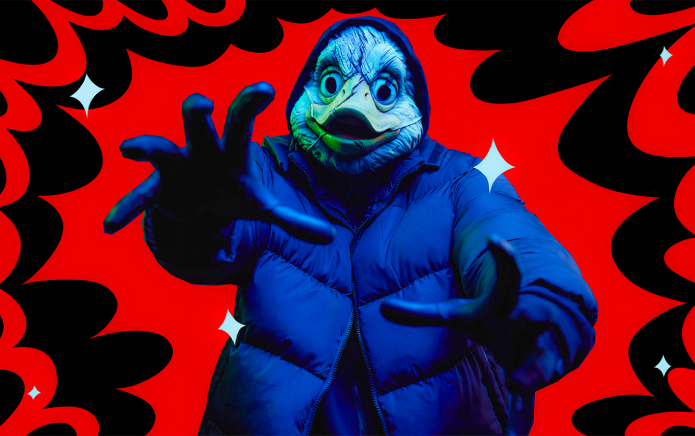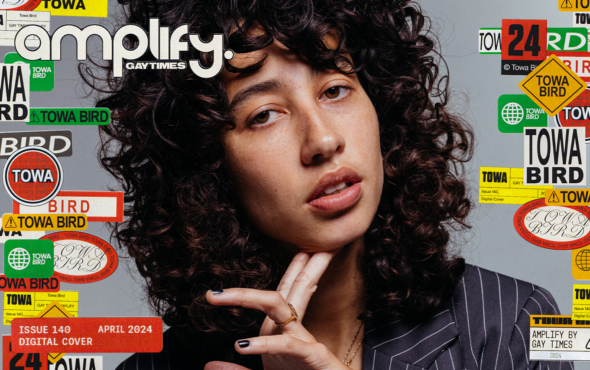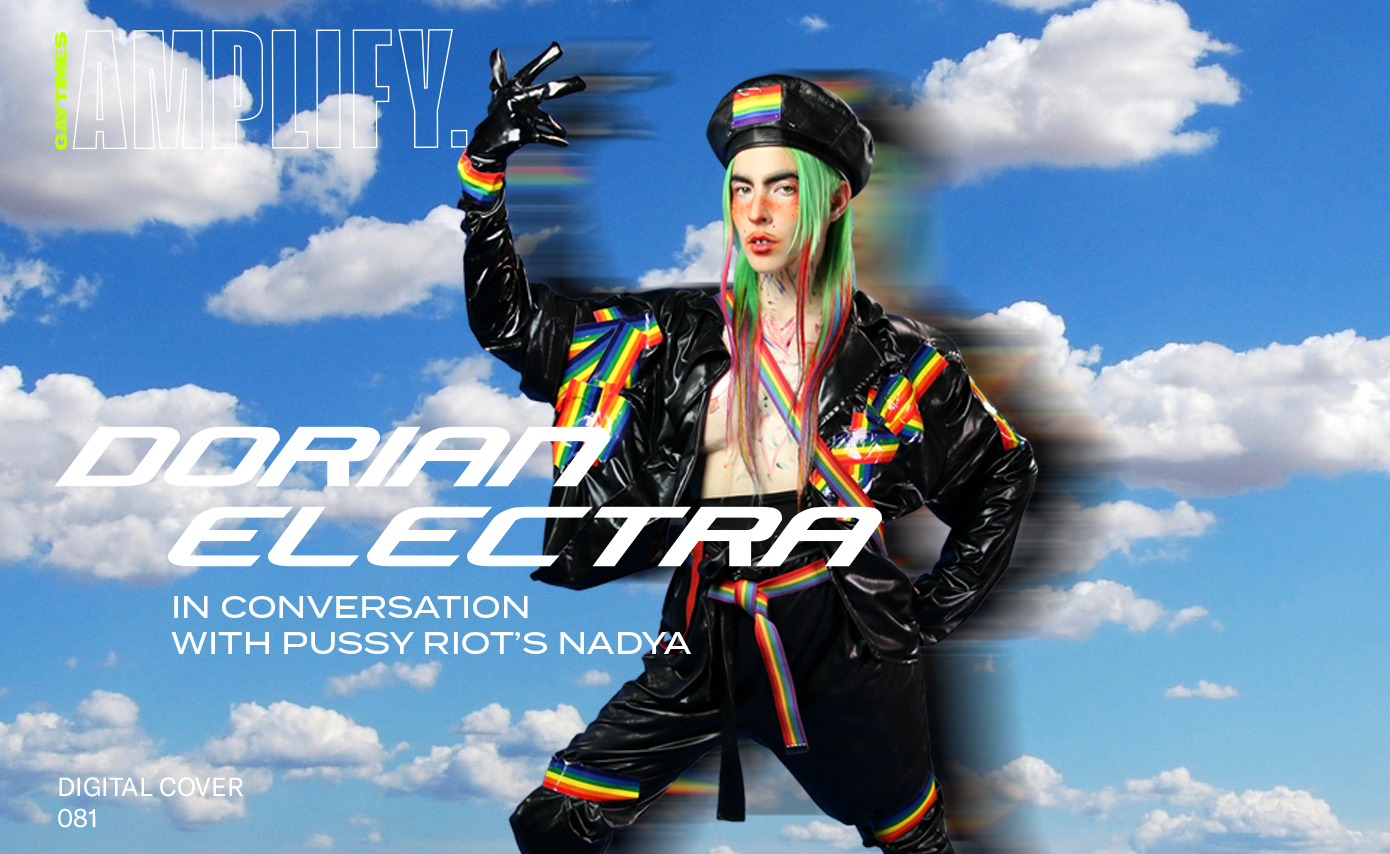
If there’s one artist out there right now who can bring together the unlikely collaborative force that is Russian art activist group Pussy Riot and classic queer All-American man band Village People, it’s Dorian Electra.
It’s exactly what they’ve done for their new single – and the title of their new album – My Agenda, which sees them channel their pop sensibility into a raucous, riotous and riveting collection of songs that pack a political punch. While Dorian’s debut explored masculinity, misogyny and feminism, its follow-up My Agenda taps into issues surrounding political radicalisation, propaganda, and the darker side of internet culture.
The production on this record is harder, intelligent humour picks away at ridiculous alt-right ideology, and My Agenda puts queer power firmly at the forefront.
Here, Dorian Electra is in conversation with Pussy Riot’s Nadya Tolokonnikova where they speak about their new collaboration, how art can inform activism, and why putting politics into pop music can have a revolutionary effect.
Nadya: Hi Dorian! So how did this project come about? How did it come to your mind to create this art?
Dorian: So, with this whole project, I wanted to do something that was like a follow up to my first album. But I wanted to get more experimental with it both with the music and the visuals, but also be more specific with the themes. On Flamboyant it was more about masculinity and gender and sexuality in broad strokes, and it was a more empowering positive message in a lot of ways, even though it did focus on some of the darker stuff. But I feel like with My Agenda, I really wanted to focus on things that were more political, more relevant, that were just on my mind and felt like they were things that I was seeing people talk about, and then also stuff that people weren’t talking about. And I just wanted to hone in on some more specific topics that we’ll get into.
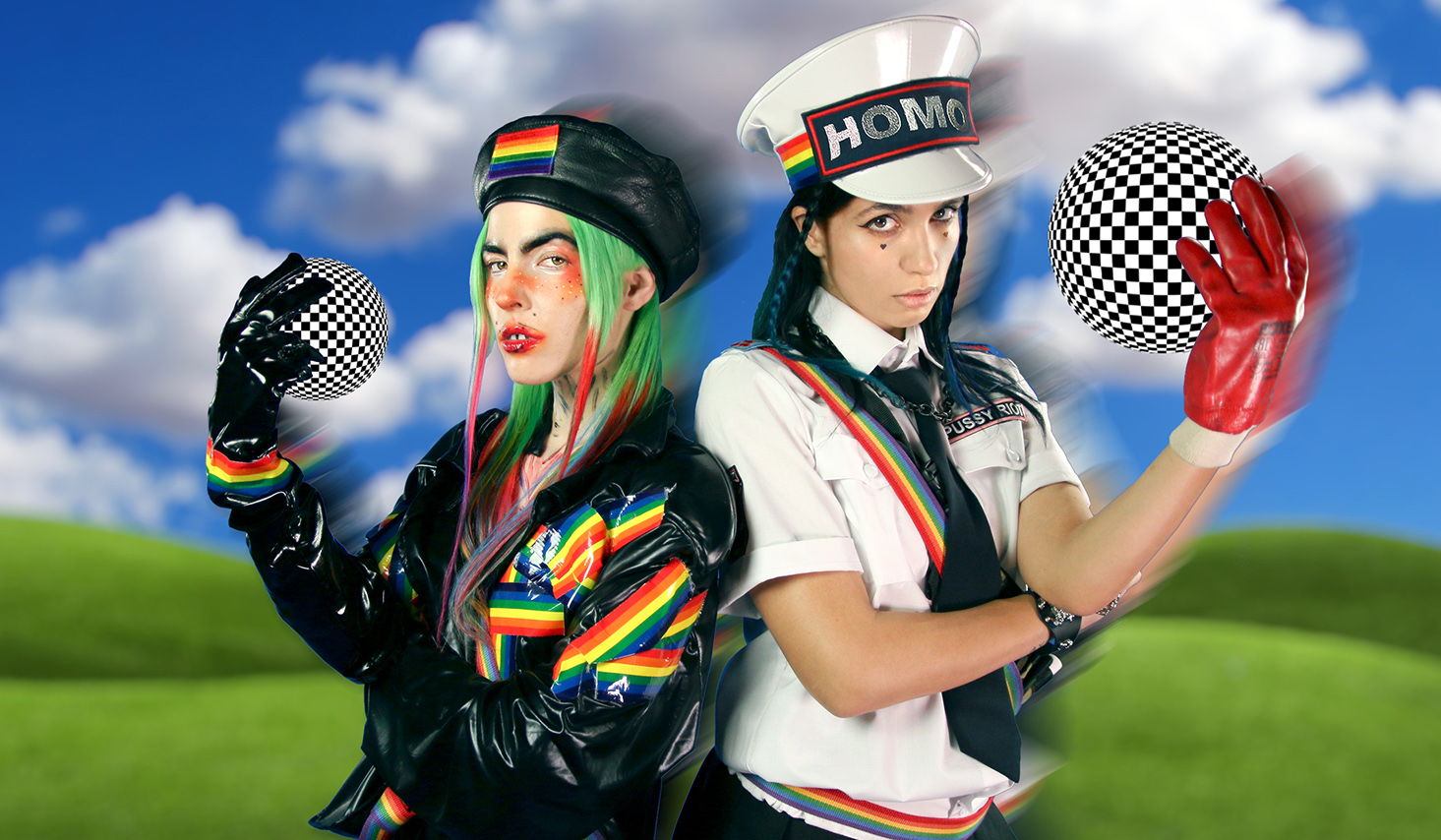
Nadya: I bet this year in particular input into this too, right? We’ve talked before about activism and actually how we are implementing our activist ideas in our art. I’m glad this year started this conversation and this thought process for a lot of artists. Well, luckily for us, we’ve been doing it for a while but I think that this year opened our eyes on a lot of things.
Dorian: Absolutely. I mean, that’s something that I’ve always been so inspired by you about, is the activism in the art being inextricable from one another. And also just like you said, this year has impacted so many people. And I hope that more people start to think about their art in that way. I mean, I also think there’s a role for people to just provide pop music that just makes people feel good too. I think that’s totally important also, but I think that hopefully we’ll start to see more people, you know, fusing activism and art.
Nadya: I actually expected more of that to have happened since Donald Trump was elected. I was among those people who predicted the blossom of political art in the United States since 2017. But it looks like it took awhile for people to, you know, think through what happens and think about how they can react and contribute to the public conversation about what’s happening. And I feel like more and more artists, they’re actually bringing political agenda to their art. Like for example, many artists before like Lady Gaga and Taylor Swift – who are amazing – but they would not inject their art with politics, but they would make entertainment songs that are just for a good time. But now they make really bold and amazing political statements. I always celebrate when people use it in their work. I feel like it has much more potential to impact people and really dig deeper into their minds.
Dorian: Totally. One thing that I am really excited by is the opportunity for people to find a gateway into music even if they’re just stumbling upon it. Especially when it’s not intentional that they’re seeking that out. They’re just trying to listen to a good song, you know, and I think a great example of that, for me is the fact that I know that Macho Man by Village People was played at Trump’s rally two days ago or whatever. That’s also so funny to me too – to think about the juxtaposition of that is just so absurd. But then to think about, maybe even if it’s just one of these thousands of Trump supporters that was there, say they’re making a playlist of music like, ‘oh, I’m patriotic – it’s Trump rally music! I’ll make a little playlist.’ And then the next recommended song after Macho Man is My Agenda because Village People are on it. You know, it’s this idea of infiltrating mainstream culture in a way that can breed openness and acceptance and more inclusiveness and diversity. Like how Village People have. They’re just a mainstream group with iconic songs that are known all over the world and played at every hetero wedding, football game, you know, whatever. And it’s just a normal part of life. But I think it can also speak so much to the queer community, but they’re also not just pigeonholed to the queer community. They also reach so far beyond that. So I think that it’s also really important to have people operating at multiple levels, you know?
Nadya: Where did the concept of My Agenda’s examination of the ‘crisis in masculinity’ through a queer lens stem from? How did you approach that?
Dorian: So I think that with Flamboyant I was trying to look at broad strokes of masculinity, the history of chivalry, feminism, taking down toxic masculinity, reclaiming and redefining masculinity and making it a positive and empowering thing. But with My Agenda, I wanted to look at the more political overlap of this kind of new internet breed of misogyny and conservatism that has spawned in the last 10 to 15 years, but really, in the last five years. Especially with the birth of the alt-right, and seeing the Incel community and other online places that kind of foster these ideas, and to see where this kind of new version of the far right [has come from]. Just to see the interesting overlap has really been so fascinating to me. It’s something I’ve kind of gotten obsessed with over the past year. I think of people who are of the same educational background as me, or like, grew up in the US and they used to identify as like liberal atheists, you know. Then to watch them be radicalised through YouTube videos and forums online, and then all of a sudden, they’re this white supremacist. Where did that come from? Why are those ideas becoming appealing to young people now? I used to think that conservatism was something for old people. I was like, ‘Oh, one day all the old people will die off.’ And then we’d be left with liberal young people. And obviously, that’s such an incorrect notion. Another thing, too, that I wanted to tackle with this is that I feel like people on the left, at least in my bubble of people that I know and interact with, a lot of them really don’t want to or are not able to, or not even aware of how they could engage with ideas on the right. A lot of people are just in their own bubble so much. I mean, myself included a lot of the time. And I think that’s why so many people, myself included, were shocked when Trump won. I mean, I feel like for you, Nadya, you just have so much more perspective globally, in general, on this kind of stuff that I’m sure for you that was probably not a surprise. I’m just guessing, but I feel like here it was unimaginable. And I feel like, because we’ve all gotten into our own bubbles, where people on the left will be like, ‘oh, somebody disagrees with me on this political idea. I’m blocking them.’ There’s no conversation. And so we’re always preaching to the choir, and tend to forget that there are people out there that have a totally different worldview. We need to speak to people that maybe were borderline alt right, or like radical leftist, that could be converted to either side. Those are people that are really worth reaching. I think that it’s possible to reach them and help them learn and expand their minds.
Nadya: How do you do that? What are your methods? How do you talk with them?
Dorian: I mean, I don’t know. I think when somebody’s already been radicalised, really there’s no conversation. I guess I mean people that are susceptible to be radicalized.
Nadya: But those people weren’t on the borderline.
Dorian: Yes, exactly. Exactly. And I think that part of it is that we’re in this current culture war where people on the right are trying to characterise the left as being anti free speech, and it was all about political correctness, and you can’t say anything without getting cancelled and all this stuff. And so they feel like they have the monopoly on edginess and saying it like it is and being real, whereas the left is like, fascist about language and pronouns and all this stuff. That’s kind of the narrative that they’ve constructed. I feel like the left traditionally had edginess on its side. It was always the left who was the cool underground. They were saying things that were inappropriate or not allowed to be said or being censored. And now people on the right – like radical far right YouTubers who are being banned from Reddit and stuff – are saying it’s contributing to this feeling of them being oppressed, which is also very dangerous. You know, that like helps strengthen somebody’s political identity.
Nadya: That’s what happened with Pussy Riot!

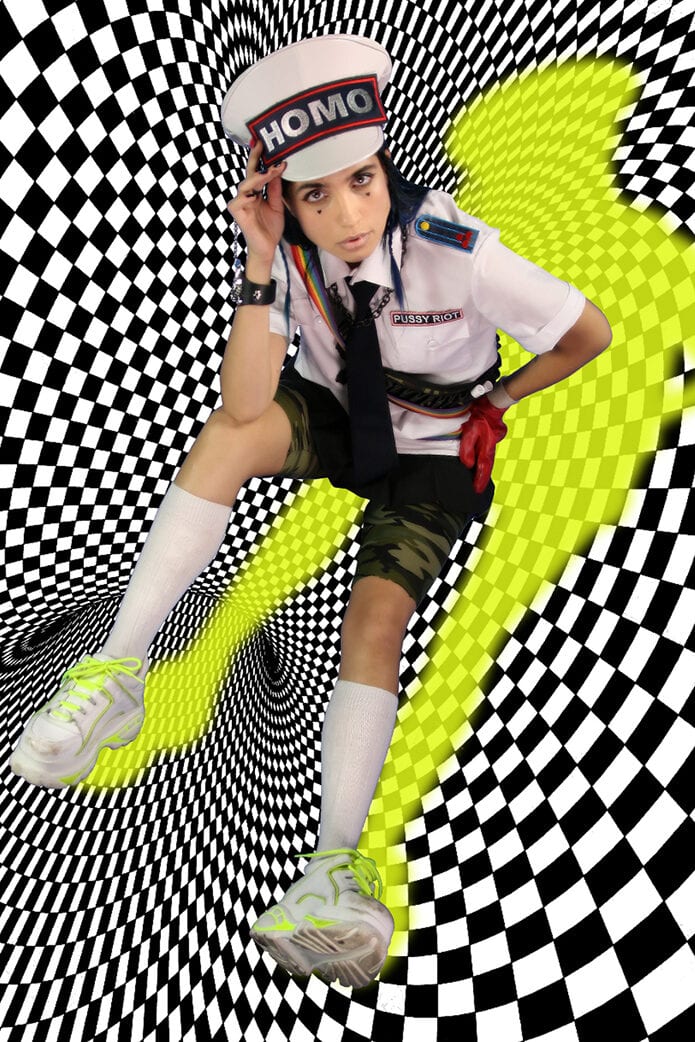
Dorian: Well, exactly! It can be totally used for good too. It can put you on this global platform. But I think people on the left are not like… we need to have more awareness of how when we do certain things, we’re really thinking for the best, what kind of reactions are they causing other people? Or what kind of effects are they having? It might be actually the opposite of what we are intending. And I think it’s just about having a greater political awareness. I feel like, if we reclaim edginess and reclaim those things that are cool, in a way we can push by winning over people that are attracted to those kinds of things. My song Edgelord is kind of about that. What are your thoughts on this?
Nadya: I’ve been thinking about this issue a lot. And hearing you, I remembered my conversation with Danny L Harle that we had, like, a million years ago in 2017. We were at a rave in London. The music was awesome and the set design – everything was edgy and cool. But why all this edginess if we cannot also use it to infiltrate people with some progressive, inclusive, left agenda? That was exactly my question to Danny. And he was like, ‘Politics is not funny. Politics is boring.’ And I was like, ‘How do you define it?’ And he was like – I’m quoting him from memory here – but his idea was that all he really likes is memes and there really is no funny, leftist, progressive political memes. So that’s why politics is boring and it’s not very edgy. So after he told that to me, I started obsessively looking for Instagram and Facebook pages, and forums for radical, anarchist queer, LGBTQ, memes. There are some out there and I feel a lot of things have changed since 2017. And I feel like for the global progressive activist movement, these last three years, they were really important because we have made big steps to actually reclaim this joy and edginess. That was our idea when we just started forming Pussy Riot. I just talked about this earlier for this big interview for a Russian LGBTQ blog. They asked me ‘what were your initial goals when you started in the late 2000s?’ And I said that one of our goals was to make politics and make progressive politics fashionable. And it may sound cheesy, but for us it was a valid goal. We talked a lot about it, because at the time when we started in 2008, it was considered mostly as a lame thing to be an activist. It mostly meant that you never showered! But it meant basically that you’re not cool, right? We wanted to bring activism and coolness together.
Dorian: Yeah, I know what you’re talking about. The first thing is to make it cool. But then secondly, it reaches another stage of where it becomes cool, but then it’s kind of meaningless. It’s funny because I think about that sometimes when I see, at these Zoom parties, or on Twitter and stuff, it’s these 12 and 13 year old TikTok kids that have, ‘BLM’ and ‘acab’ in their username. It’s so fascinating, because it’s cool that really young kids are being exposed to all these ideas. But it is also interesting, because for me, I’m like, I don’t want to be, as an older person, as an artist, I don’t want to create an environment where I’m pressuring. I want people to obviously think for themselves and to think it through and just be thoughtful about it and not feel like it’s a thing they have to conform to where they will be cast out. You know what I mean? I think having awareness at a young age, though, is it a good thing.
Nadya: For your first album Flamboyant you created characters based around male stereotypes and played on male tropes. Do you have new ones that you’re introducing for your My Agenda project?
Dorian: I’ve got the Neck Beard character that I love being. I learned that wearing the fedora and the trench coat and the cargo shorts and all that is it the most comfortable outfit ever. Fashion is a huge part of it for me. I love integrating historical fashion and reappropriating and putting it in a new context. But I would say that the song that we have together – the title track My Agenda – basically that character is sort of this fictional member of this gay militia. The song when we originally wrote it was very earnest in its expression. It was about the fight for queer rights. But I think that there’s also a self-aware element of what I was originally inspired by which was the gay agenda. I was looking at a time in history where ‘these homosexuals are trying to come in and brainwash her kids’ and you know, ‘put Atrazine in the water that’s turning the friggin frogs gay’. That’s like this Alex Jones thing that he rants about and it’s become a meme about turning the friggin frogs gay. So we basically were kind of riffing on all this and playing into some of these really deep conservative fears about like, ‘oh, we’re the gay agenda, and we’re like, ‘we’re on every corner and we’re just waiting to get you and your kids during the day!’ It just all came together so perfectly because I knew that the song itself had a slight boyband military vibe to it. Then I reached out to you, Nadya, and we were like, wouldn’t it be crazy if you are on this. Then we got Village People, and I was like, ‘there’s no way – this would be too insane!’ Because, with Village People, their real reappropriation of the military man trope, especially from within from gay culture, it just goes right over so many people’s heads. It’s this subtle infiltration of like, queer culture that is so powerful. I can’t believe they said yes. And they were like, ‘we’re fans of Pussy Riot’ and I just thought that was so cool. It’s just like the ultimate features track to me and I feel like we all kind of take on our own persona that is real and also plays into this story in such an interesting way that that’s probably my favourite persona on this project.
Dorian Electra’s new album My Agenda is available to stream and download from 16 October.
